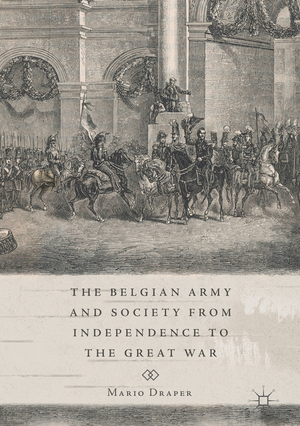The Belgian Army and Society from Independence to the Great War
Autor Mario Draperen Limba Engleză Hardback – 22 feb 2018
This book explores Belgian state-building through the prism of its army from independence to the First World War. It argues that party-politics, which often ran along geographical, linguistic, and religious lines, prevented both Flemings and Walloons from reconciling their regional identities into a unified concept of Belgian nationalism. Equally, it obstructed the army from satisfactorily preparing to uphold Belgium’s imposed neutrality before 1914. Situated uneasily between the two powerhouses of nineteenth-century Europe, Belgium offers a unique insight into the concepts of citizenship and militarisation in a divided society in the era of fervent nationalism. By examining the composition, experience, and image of the army’s officer corps and rank and file, as well as those of the auxiliary forces, this book shows that although military and civilian society often stood aloof from one another, the army, as a national institution, offered a fleeting glimpse into the dichotomy thatwas pre-war Belgium.
| Toate formatele și edițiile | Preț | Express |
|---|---|---|
| Paperback (1) | 581.98 lei 6-8 săpt. | |
| Springer International Publishing – 6 iun 2019 | 581.98 lei 6-8 săpt. | |
| Hardback (1) | 591.96 lei 6-8 săpt. | |
| Springer International Publishing – 22 feb 2018 | 591.96 lei 6-8 săpt. |
Preț: 591.96 lei
Preț vechi: 696.42 lei
-15% Nou
Puncte Express: 888
Preț estimativ în valută:
113.27€ • 118.56$ • 94.28£
113.27€ • 118.56$ • 94.28£
Carte tipărită la comandă
Livrare economică 31 martie-14 aprilie
Preluare comenzi: 021 569.72.76
Specificații
ISBN-13: 9783319703855
ISBN-10: 3319703854
Pagini: 289
Ilustrații: XIX, 281 p. 3 illus., 2 illus. in color.
Dimensiuni: 148 x 210 x 29 mm
Greutate: 0.64 kg
Ediția:1st ed. 2018
Editura: Springer International Publishing
Colecția Palgrave Macmillan
Locul publicării:Cham, Switzerland
ISBN-10: 3319703854
Pagini: 289
Ilustrații: XIX, 281 p. 3 illus., 2 illus. in color.
Dimensiuni: 148 x 210 x 29 mm
Greutate: 0.64 kg
Ediția:1st ed. 2018
Editura: Springer International Publishing
Colecția Palgrave Macmillan
Locul publicării:Cham, Switzerland
Cuprins
Chapter 1 – Introduction.- Chapter 2 – Securing the Nation.- Chapter 3 – The Officer Corps.- Chapter 4 – The Rank and File.- Chapter 5 – The Auxiliary Forces.- Chapter 6 – Fortress Policy and Strategy.- Chapter 7 – The Great War.- Chapter 8 – Conclusion.- Index.
Notă biografică
Mario Draper is Lecturer in Modern British and European History at the University of Kent, UK. His research focuses on the links between European armies and their parent societies in the nineteenth and twentieth centuries, with a particular focus on identity, nationalism, and citizenship.
Textul de pe ultima copertă
This book explores Belgian state-building through the prism of its army from independence to the First World War. It argues that party-politics, which often ran along geographical, linguistic, and religious lines, prevented both Flemings and Walloons from reconciling their regional identities into a unified concept of Belgian nationalism. Equally, it obstructed the army from satisfactorily preparing to uphold Belgium’s imposed neutrality before 1914. Situated uneasily between the two powerhouses of nineteenth-century Europe, Belgium offers a unique insight into the concepts of citizenship and militarisation in a divided society in the era of fervent nationalism. By examining the composition, experience, and image of the army’s officer corps and rank and file, as well as those of the auxiliary forces, this book shows that although military and civilian society often stood aloof from one another, the army, as a national institution, offered a fleeting glimpse into the dichotomy that waspre-war Belgium.
Caracteristici
Explores the complicated relationship between the Belgian army and society from 1830 to 1914 Provides insight into the concepts of citizenship, nationalism and militarisation in a divided society Argues that the Belgian army failed to foster a unified national identity from independence to the start of the First World War
